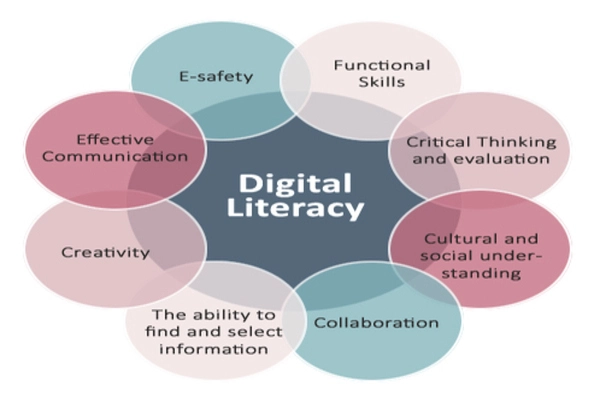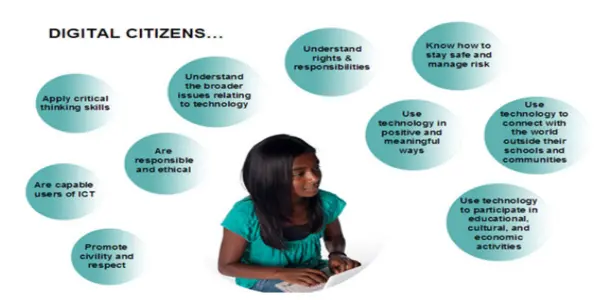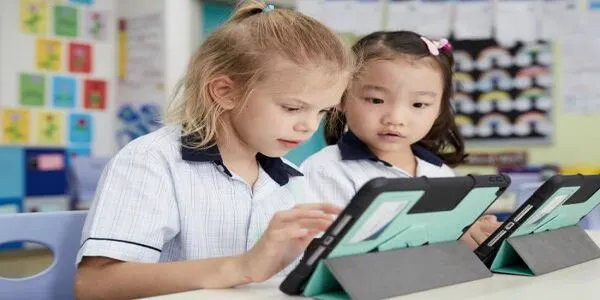Children today have grown up with technology. You know that technology is a powerful tool that can expand your child’s horizons, but it can also be dangerous. It is imperative that children learn the importance of using technology safely and effectively at all times.
Your child should understand basic internet security, such as setting strong passwords, being aware of the dangers of strangers online, understanding the concept of fingerprints, and being respectful online. Your child must also learn how to be a good digital citizen who knows how to participate responsibly online and who can tell the difference between reality and fiction in the digital realm.
Contents

At One World International School, we harness the power of technology while teaching your child how to use it responsibly. You can use this guide to help you and your child better understand the importance of digital and digital citizenship.
What is Digital Literacy?
Digital literacy is information mastery. A literate child will understand how to use their favorite tech devices and tools to get information. In addition, they will learn which sources are appropriate to use for factual information and which sources can spread misinformation on the internet. In addition to learning how to use digital tools to gather information, students will learn about the ethics involved in acquiring knowledge online, as part of the technical literacy learning process. their number. They will learn the importance of citing different sources when using them and the responsible use or sharing of information they find online.

What does digital citizenship mean?
The concept of digital citizenship focuses on children’s online behavior. Students begin learning about cybersecurity and digital citizenship as soon as they start using internet-connected devices. Some of the most important concepts covered in the digital citizenship lessons include:
Creating and storing secure passwords.
Understanding what does and does not constitute personal information and learn the importance of keeping personal information private.
Know that photos can inadvertently reveal personal information when pictures are shared online.
Understand your tone, voice, and actions they online will leave a digital footprint that will last for years to come.
Why are digital literacy and digital citizenship important for students of all ages?

From the moment your child starts using a smartphone or tablet for educational or recreational purposes, they should be aware of both the concepts of digital literacy and citizenship. digital. You can use these age-based guidelines to determine how and when to introduce these concepts to your child:
Preschool Students – Allow your child to use technology with or with friend. Avoid letting them play online alone and keep track of all interactions. This can help you be aware of any problems that may arise.
Elementary Students – Give your child the freedom to start using age-appropriate apps and games. Check to make sure that all parental control settings are in place. Elementary school students need to know how to create secure passwords and how to stay anonymous online. They should also learn to talk well online and be open with their parents about any issues that arise in the digital realm.
High School Students – High school students can interact online at different levels, and it is important that they have a well-developed sense of digital citizenship. They need to be aware of online etiquette and understand the warning signs that someone may not have good intentions when interacting with them.
Also check:
-
5 Best Computer Course in India for Private Job (India में प्राइवेट नौकरी के लिए 05 BEST कंप्यूटर कोर्स)
-
Google jobs in India | Google में चाहिए नौकरी तो कर ये 5 कोर्स - मिलेगा लाखों का पैकेज | Google Jobs
-
Retail Management Career | Retail Jobs | How to get Retail Management Job
-
How to Start Earning as a Graphic Designer?
-
Paramedical Courses | Paramedical Career | कम बजटऔर कम फीस में मेडिकल करियर बनेगा
How can you help your child use technology safely and effectively at home?
One of the most important things you can do as a family is create a digital family agreement. This agreement may define rules that all family members must follow. You need to set device time limits for all family members and make sure to stick to them. The whole family should agree on what you can do online and at home, and you can work to distinguish between valuable online content and content that is rigorously designed to solve problems. mind.
Know the benefits of using technology in the classroom

OWIS students are using technology to learn
Children today are digital natives, and it is assumed they will use it Technology in the classroom is natural. Children realize many benefits when they are introduced to technology in a safe and productive way. Here are some of the key benefits of integrating technology into the classroom:
Technology allows students to collaborate in creative and fun ways.
Digital tools that allow teachers to personalize your child’s learning experience.
Technology allows children to get near-instant feedback from their teachers.
How OWIS imparts digital knowledge to our students
At OWIS, we believe technology plays an important role in educating 21st century learners, that’s why at OWIS why we incorporate it into all learning levels. Therefore, we emphasize the importance of digital literacy, cybersecurity and digital citizenship for all of our students. All of our students (or their parents) sign an ICT agreement that sets out the rules and guidelines for using technology at school. We introduce the concepts of digital literacy and digital citizenship in an age-appropriate manner to our students of all learning levels.
Students of all ages will become content consumers as well as content creators on the internet. It is therefore essential that students develop a solid understanding of what it means to be a good digital citizen. Your child will need to practice these skills now to use them effectively in the future, no matter what role they take on.

